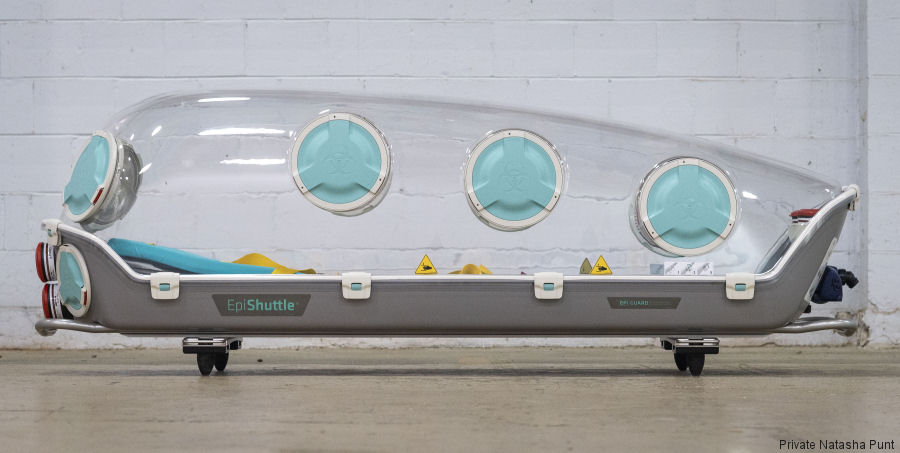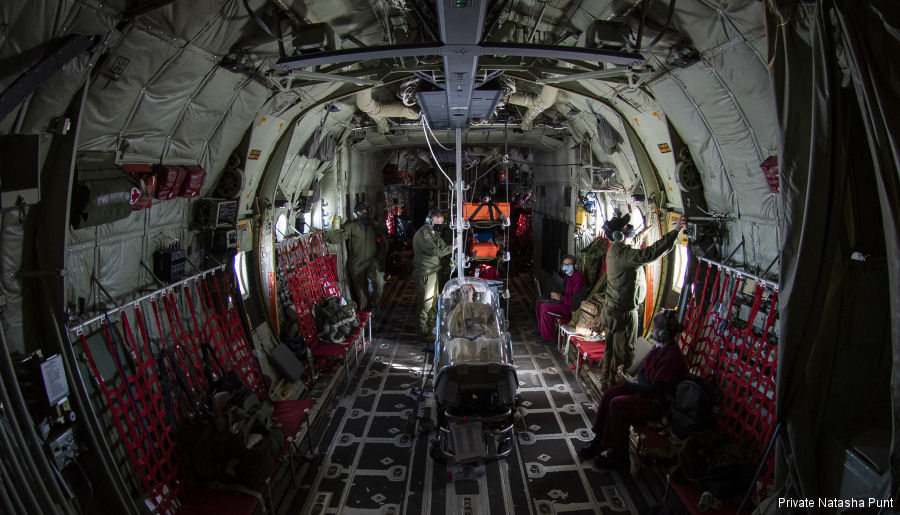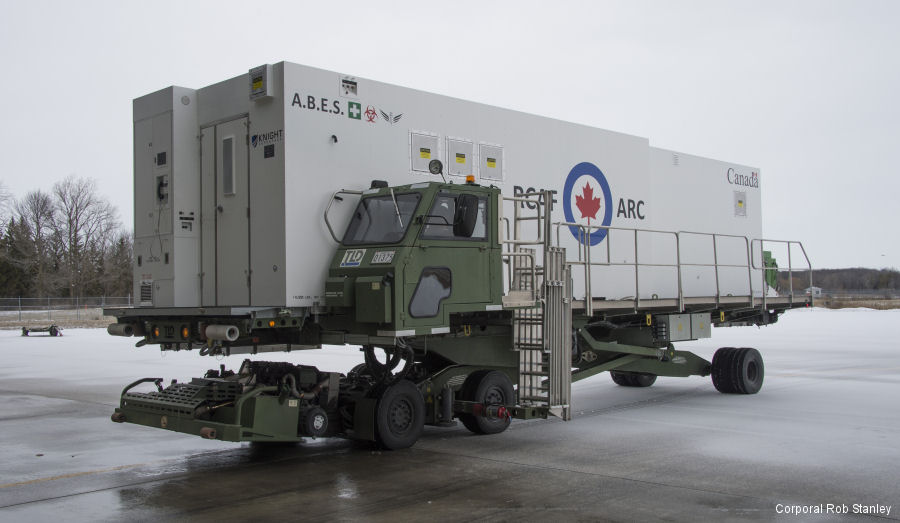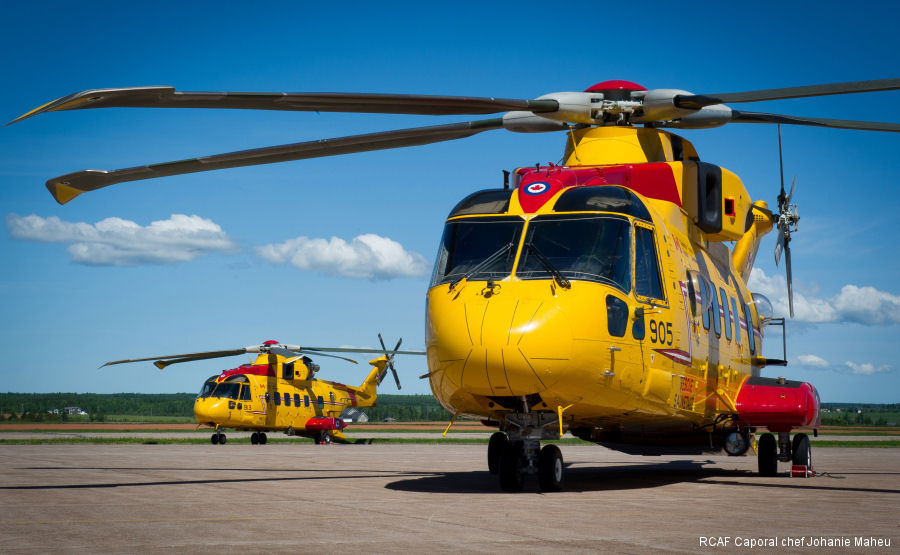
The EpiShuttle is a single patient transport and isolation system, protecting both medical personnel and patients. It also allows for contagious patient treatment during transport, without the risk of infecting others.
- (...) Our mandate is to provide quality health care in the air, at home and abroad. Caring for patients with an infectious disease adds a significant level of complexity; this new capability is an extra tool to help us bring patients back home or to the appropriate level of care safely, says Major Marilou Beaucage, the senior Nursing Officer with the Canadian Armed Forces (CAF) Aeromedical Evacuation (AE) Flight at 8 Wing Trenton, Ontario, in a press release.
Five EpiShuttles goes to RCAF’s primary search and rescue squadrons. The remaining ten devices are stationed at 8 Wing Trenton, ready to launch an evacuation of infectious patients.
I addition to RCAF, The Royal Air Force in Scotland, The Royal Norwegian Air Force and the Royal Danish Air Force as well as ground ambulance services, private air transport companies and hospitals, deploy the EpiShuttle.
- The EpiShuttle makes transport safe, reduces cost and increases operational efficiency of patient transport. From the pandemic, we have learnt a lot about emergency preparedness and the crucial role of safe patient transport. Disinfection of vehicles puts transport vessels out of play, and in case of exposure, a whole team can be grounded for days. With the EpiShuttle there is no need for disinfecting vehicles. In addition, medical personnel do not need to wear full personal protective equipment while transporting highly contagious patients inside the EpiShuttle, says Ellen Cathrine Andersen, CEO of EpiGuard.
Also, in case of a local outbreak, the local Winnipeg based airliner Keewatin Air can with their EpiShuttles offer fast and safe transport, even from remote locations.
- We found the EpiShuttle to have unparalleled features. The EpiShuttle allows patient monitoring and full intensive care treatment during transport, including emergency procedures like intubation and insertion of central venous catheters. In addition, for Covid-19 patients, the adjustable backrest is extremely important to keep coughing at a minimum. However, it was the fact that the EpiShuttle is re-usable, making it the most cost efficient product on the market, which made us decide on the EpiShuttle, said Executive Director of Medical Operations at Keewatin Air, Janet Busse, in a press release.
EpiGuard is a Norwegian company established in 2015 providing better solutions for safe transportation of contagious patients. Our team of medical experts and engineers developed the EpiShuttle based on analysis and clinical first-hand experience from previous global epidemics. Our medical background ranges from intensive care, infectious diseases, internal medicine and anesthesiology, and transport medicine. EpiShuttle improves patient safety and care, the safety for health care providers, reduce costs and increase operational efficiency. Saving one – protecting everyone.
RCAF implements new bio-containment capability to transport infectious patients
RCAF, February 21, 2021 - With the world still dealing with the threats posed by the COVID-19 pandemic, the Royal Canadian Air Force (RCAF), in collaboration with Canadian Forces Health Services Group, is implementing a new bio-containment capability for the transport of infectious patients.
Called the Aeromedical Single Isolation Bio-containment Unit (ASIBU), this new capability allows for the safe isolation of patients thought to be contagious while allowing medical experts to provide direct treatment. In effect, it allows medical staff to treat patients with virtually zero possibility of transmission of infection in either direction, all while being transported in an aircraft.
“The ASIBU capability will allow us to safely and effectively transport infectious patients by air, while our medical personnel provide treatment,” says Major Marilou Beaucage, the senior Nursing Officer with the Canadian Armed Forces (CAF) Aeromedical Evacuation (AE) Flight at 8 Wing Trenton, Ontario. “Our mandate is to provide quality health care in the air, at home and abroad. Caring for patients with an infectious disease adds a significant level of complexity; this new capability is an extra tool to help us bring patients back home or to the appropriate level of care safely.”
Measuring approximately two metres long by one metre wide, the ASIBU is a durable, reusable “capsule” for a single patient with sealed ports on its sides. This enables health care providers to access the patient, while protecting those outside the capsule from exposure to potential infectious pathogens. Because of its relatively small size, the ASIBU can be used in most of the RCAF’s aircraft, including the CC-177 Globemaster, CC-150 Polaris, CC-130 H/J Hercules, CP-140 Aurora, CH-147F Chinook, CH-149 Cormorant and the CH-148 Cyclone. The CC-130J Hercules will be the primary platform by which the ASIBU will be employed.
A total of 15 ASIBUs (trademark EpiShuttle) were ordered and have been delivered, with one going to each of the RCAF’s five primary search and rescue squadrons across the country. The remaining ten units will stay at 8 Wing Trenton, which will be the operational focal point for the ASIBU. This includes a “standby” allotment of ASIBUs that are ready to evacuate up to four infectious patients on a single CC-130J Hercules flight.
The RCAF is currently working with the 1 Canadian Air Division Surgeon and the CAF AE Flight on the operational implementation of this new capability, which includes the development and testing of procedures and training programs. The expectation is that the ASIBU will be fully operational in early 2021.
The ASIBU is just one of the new bio-containment capabilities that the RCAF is investing in, with the aim of providing a cutting-edge ability to conduct safe aeromedical evacuation of potentially infectious patients. In addition to the ASIBU, the RCAF is also procuring the Aeromedical Bio-containment Evacuation System, which is a large, sea-container-sized containment unit, and Disposable Isolation Single Bio-containment Units, which are essentially lighter, one-time-use versions of the ASIBU. All told, the total investment is valued at approximately $7.3 million.
“The RCAF is on the path to becoming much more agile in the safe aeromedical evacuation of infected patients,” says Lieutenant-General Al Meinzinger, Commander of the RCAF. “These procurements will provide the RCAF with the most advanced equipment commercially available to build a capability for now and for years to come.”
The global coronavirus pandemic makes this new capability timely, but the RCAF also has its eye on more long-term requirements. With serious outbreaks of Ebola in Africa in recent years, and the ever-present possibility of yet another pandemic of influenza or other infectious diseases, these new capabilities are key to ensuring the RCAF’s ability to provide the Government of Canada with effective options for safe aeromedical evacuation at home and abroad.

The isolation stretcher can be loaded in most of the RCAF aircraft, including CC-177 Globemaster, CC-150 Polaris, CC-130 H/J Hercules, CP-140 Aurora, CH-147F Chinook, CH-149 Cormorant and CH-148 Cyclone

The Aeromedical Bio-containment Evacuation System, which is a large, sea-container-sized containment unit, will provide the RCAF with the ability to conduct safe aeromedical evacuation of potentially infectious patients.

RCAF CH-149 Cormorant Search and Rescue helicopters
See also |
List of Coronavirus outbreak




